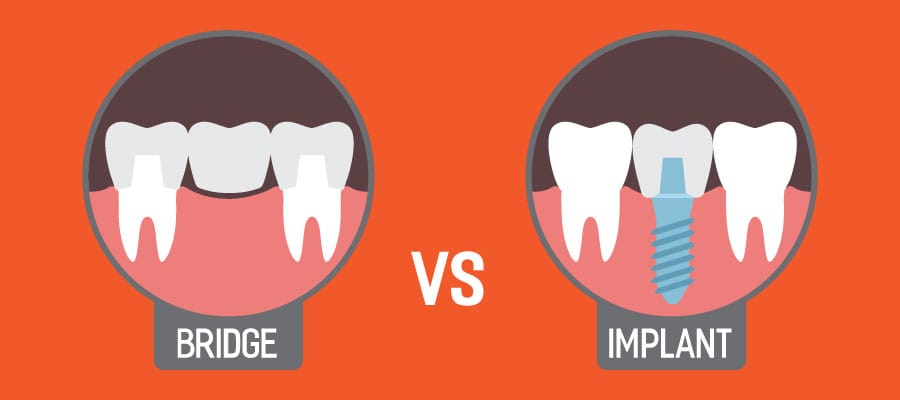Are you confused about which one to choose: an implant or a bridge? Suppose you’ve lost one or more teeth and are tired of removing your dental bridge every night. In that case, you may want to consider more permanent tooth replacement options. Dental implants have become very popular recently. However, traditional fixed bridges are the preferred tooth-replacement option for some people. So what’s the difference between these two? Read on to learn about the difference between dental bridges and implants and signs that you may be the right candidate for dental bridges than implants.
Dental Implants vs. Bridges
What’s the difference?
While dental implants and dental bridges are both used to replace missing teeth, they have their own advantages and disadvantages.
A dental implant consists of a screw or a metal post. This screw is then implanted into the jaw, followed by a crown placed on top of the screw. A crown or cap is created to look, feel, and function like a natural tooth. If you’re someone with a healthy mouth and properly cared for it, dental implants can last up to 40 years or more.
On the other hand, a fixed dental bridge is made up of multiple crowns. Two crowns are attached to the nearest healthy tooth adjacent to the missing one on each side. One or more additional crowns are then attached to these crowns, replacing the missing tooth or teeth. This placement doesn’t require surgery, unlike dental implant placement. The lifespan of dental bridges is generally up to 20 years or more when cared for well.
When are dental bridges better than implants?
Now that you know the difference between fixed dental bridges and dental implants. Let’s look at when dental bridges are a better option than implants. Read on to find out signs you may be the right candidate for a fixed bridge than an implant.
You have diabetes
Patients with diabetes have a lesser chance of success for dental implants than those with no diabetes. The possibility of wound infection and slow wound healing in diabetics are the two reasons why an implant is often a failure for diabetes sufferers.
You experience periodontal disease.
People with gum disease must first improve their gum health before opting for a dental implant. Infected gums are filled with bacteria that often lead to a severe implant infection, which causes implant failure. Suppose you’re having a problem eradicating gum disease. In that case, you can choose dental bridges since they are not implanted into the gum tissue. Thus, they are less likely to be affected by gum disease.
You’re a smoker
People who smoke cigarettes have a 20% chance of implant failure. As smoking cigarettes cuts off blood supply to your gums, it can delay wound healing that must occur after implant placement. Conversely, this is not the case with dental bridges. So, smoking is unlikely to affect your dental bridge.
If you’re missing teeth and looking for a solution, use this information to determine which one suits you best. Moreover, we advise you to talk with your dentist to learn more about them. They will guide you after assessing your unique oral condition and your preferences.

Comments
Post a Comment